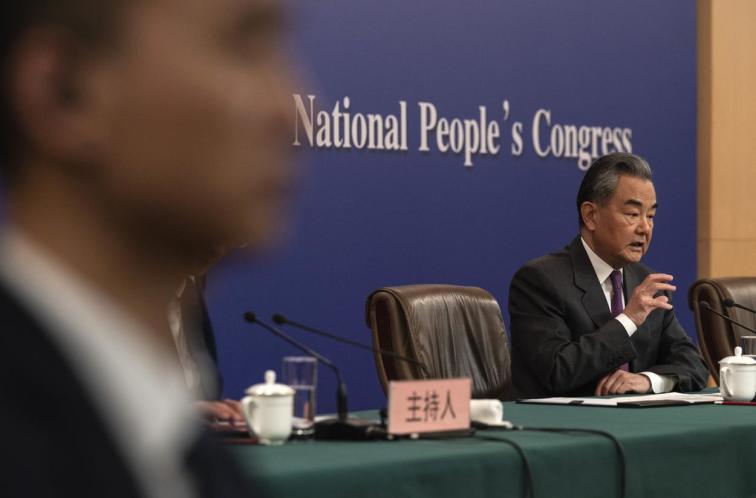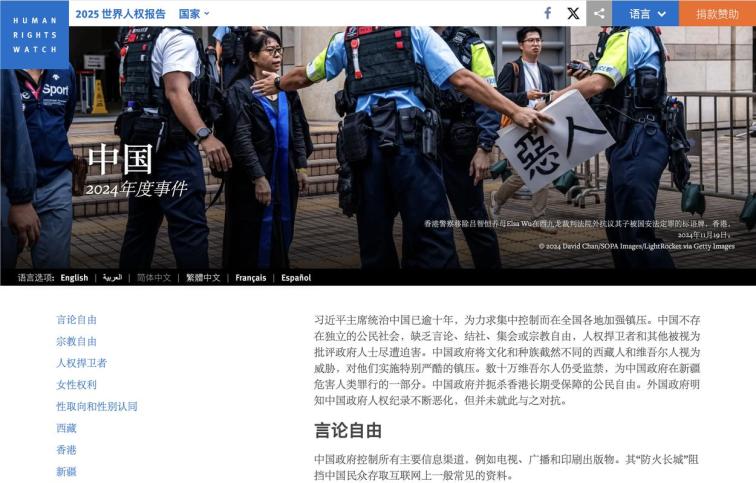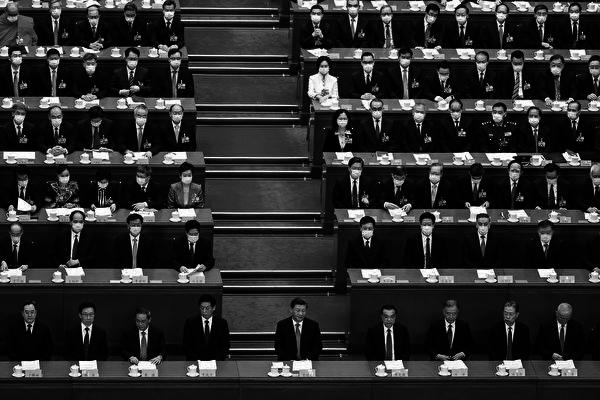On June 28, 2025, Falun Gong practitioners held a rally and parade in Auckland, New Zealand, exposing the Chinese Communist Party’s (CCP) 26-year-long persecution of Falun Gong practitioners and calling on the international community to join efforts to stop the CCP's crimes against humanity. Pictured is human rights lawyer Kerry Gore speaking at the rally. (Zhao Kai / Dajiyuan)
[People News] Ten years ago, on July 9, 2015, a massive, aggressive crackdown on rights lawyers swept across China: police abducted lawyer Wang Yu from the Beijing Fengrui Law Firm along with her husband and son, without any legal or factual basis. Soon after, fellow lawyers from the same firm — Wang Quanzhang, Zhou Shifeng, Huang Liqun, and others — were also kidnapped. The CCP quickly launched a nationwide dragnet targeting human rights lawyers. Over a hundred lawyers were illegally detained, sentenced, or tortured. The international community reacted with shock and condemnation.
This state-sponsored atrocity, known as the “709 Crackdown,” was a premeditated, organised crime by the CCP. It posed a glaring question to the world: why would the regime fear these human rights lawyers — ordinary intellectuals with no weapons, no backing, and no political power — so much that it would lock them up? What exactly is the CCP afraid of?
It is well known that Falun Gong practitioners are among the most severely persecuted groups in China today. The brutal suppression of Falun Gong is a top secret and a “high-voltage red line” for the CCP. Many of the lawyers abducted in the 709 incident had defended Falun Gong practitioners in court. By crossing this red line, they became targets for CCP retaliation. The answer to the question of the CCP’s fear may lie in these lawyers’ courtroom arguments. Let us revisit some highlights of their professional conduct in defence of faith — it may offer clues to that very question.
Six Lawyers in Shijiazhuang Court
On April 27, 2007, three Falun Gong practitioners from the Wang family were illegally tried in Shijiazhuang, Hebei Province. Six lawyers from Beijing — Li Heping, Teng Biao, Li Xiongbing, Zhang Lihui, Li Shunzhang, and Wu Hongwei — appeared as a group in a Chinese court for the first time to defend Falun Gong practitioners. The scene was powerful and unprecedented. Their joint defence statement, titled “Supremacy of the Constitution, Freedom of Belief,” systematically argued from universal principles, international law, constitutional rights, and the rule of law that: “It is not a crime to exercise constitutional rights, not a crime to uphold belief, not a crime to spread one's belief, and not a crime to speak about one’s suffering or to clarify the truth.” To explain the universal legal principle that thought (or belief) is not a crime and criminal law punishes only actions, the statement included:
“Anyone with basic criminal law knowledge knows that in both common law and civil law systems, criminal law only punishes actions — thought or belief itself does not constitute a crime. This is a cornerstone of criminal justice. Religious belief is a matter of thought and should not be punished under criminal law. Citizens must not be treated unfairly for holding a certain religious belief. Belief itself or the identity of a believer is not subject to criminal punishment.”
They quoted Thomas Jefferson to counter fears of “heresy” or “dangerous beliefs”: “Truth is great and will prevail if left to herself. She is the proper and sufficient antagonist to error... unless by human interposition disarmed of her natural weapons — free argument and debate... Error ceases to be dangerous when reason is left free to combat it.” “Human beings are social in nature and must engage in society, history, and freely receive and share information. Without this, their lives lack dignity; their humanity cannot fully develop. True freedom of belief requires freedom of expression — this is now a core aspect of modern humanism.”
Lawyer Xie Yanyi from Beijing Fengrui Law Firm
“You may not be judged today, but that does not mean you will not be judged in the future.” That was the stern warning Beijing human rights lawyer Xie Yanyi gave to prosecutors and judges in court.
On May 25, 2015, the Huaiyang County Court in Henan Province held an illegal second trial for Falun Gong practitioner Wang Xianhuai, who had been sentenced to three years in prison in the first trial. Xie Yanyi defended him in court. In his defence argument, Xie dissected the CCP’s commonly used charge against Falun Gong practitioners: “Using a cult organisation to undermine the implementation of law.” He pointed out that one of the four essential components of a crime — the object of the crime — did not even exist in this case.
Xie said: “The object of this crime is the enforcement of national laws and administrative regulations. ‘Organising and using’ are merely tools or means of committing the crime. Disrupting the implementation of laws means that a law or regulation cannot be applied or enforced in practice — that is, very different from merely violating or breaking the law. Violating a law means a person’s behaviour contravenes the legal provisions — that is ‘illegal.’ Meeting the elements of a crime means the behaviour fits a legal definition — that is, ‘criminal.’
But whether illegal or criminal, neither can cause a law to stop functioning. In fact, enforcement is how the legal system responds.
Truly undermining the law — preventing it from being implemented — requires a level of power only possessed by someone with state authority.
In this case, Wang Xianhuai is an ordinary citizen, a simple Falun Gong practitioner. How could he possibly have the ability or power to disable the implementation of any law or regulation? Moreover, during the first trial, the prosecutor presented no evidence showing how the defendant disrupted the application of any law or regulation, or which specific law or regulation was affected.
Therefore, the defence concludes: The defendant neither used a cult organisation nor disrupted the implementation of national laws or administrative regulations. His actions do not violate Article 300, Clause 1 of the Criminal Law.”
As is commonly known, every crime requires four elements: 1. The subject (person committing the crime). 2. The subjective element (intent or motive). 3. The objective element (action). 4. The object of the crime (the protected legal interest). If even one element is missing, there is no crime. Xie Yanyi’s defence was logically airtight and legally flawless. Wang Xianhuai was acquitted and released.
Renowned Chinese Human Rights Lawyer and Central South University Professor Zhang Zan-ning
Falun Gong practitioner Wu Hongwei was an official with the Organisation Department of Yuancheng District, Heyuan City, Guangdong Province. After Jiang Zemin initiated the persecution of Falun Gong, she was subjected to multiple instances of persecution. On August 5, 2015, she was abducted by the Yuancheng Public Security Bureau and subjected to repeated torture during interrogations. On November 27, 2015, the Yuancheng District Court held an illegal trial of her case. Lawyer Zhang Zan-ning, from Jiangxi Huagang Law Firm, delivered a powerful defence of Wu Hongwei’s innocence. Although applause was not permitted in court, the gallery nonetheless broke out in enthusiastic applause multiple times. During his defence, Lawyer Zhang pointed out that the main evidence in the case was illegally obtained. He stated:
"During the review of the case files, I was surprised to find a 'Notice for Evidence Collection' issued to the 610 Office of Yuancheng District. We all know the 610 Office is an extralegal organisation secretly established by former General Secretary Jiang Zemin specifically to persecute Falun Gong. This shows that the primary evidence in this case was actually collected from the Yuancheng District 610 Office of the Chinese Communist Party. The head of this organisation, Li Dongsheng, has a notorious record and is currently under investigation by judicial authorities. The notice was signed by 'He Peicheng.' According to page 26 of the case file, He Peicheng is a staff member of the Yuancheng District 610 Office. From He Peicheng’s testimony, it’s clear he was essentially legitimising his own illegal behaviour."
On December 12, 2015, Lawyer Zhang Zan-ning received a phone call from Heyuan police in Guangdong notifying him that Wu Hongwei had been released from custody.
Lawyer Li Zhongwei, Yuanhua Law Firm, Shandong Province
On August 7, 2015, the Sanhe City Court in Hebei Province held an unlawful trial for Falun Gong practitioner Wen Jie. Lawyer Li Zhongwei cited constitutional provisions to fully demonstrate that Wen Jie’s efforts to inform the public about the persecution of Falun Gong were entirely within her constitutional rights. In his defence statement, he said:
"Article 36 of the Constitution of the People’s Republic of China states: Citizens of the PRC enjoy freedom of religious belief. No state organ, social organisation, or individual may compel citizens to believe or not believe in any religion, nor discriminate against citizens who do or do not believe in religion. The state protects normal religious activities.
Freedom of religious belief includes the freedom to disseminate one’s beliefs. Practitioners do not require government approval to express or spread their faith unless their actions violate legal provisions. And even then, the legal provisions must conform to the Constitution to be legitimate.
Article 35 of the Constitution also states that citizens enjoy freedom of speech, the press, assembly, association, procession, and demonstration. The right to disseminate religious information is also protected under freedom of speech. Citizens have the right to express their opinions on any social issue, orally or in writing. The informational materials distributed by Falun Gong practitioners are simply an exercise of their lawful freedom of expression.
Constitutional rights are meant to be exercised—they are the living spirit and power of the law. A constitution that cannot be practised is not a real constitution. Only a constitution in practice is a true constitution. No one should be found guilty for exercising those rights.
Ms. Wen Jie was previously sentenced to nine years in prison for exercising her constitutional right to freedom of belief and speech. She is a true defender and practitioner of constitutional rights. She believes in Falun Gong and pursues the principles of 'Truthfulness, Compassion, Forbearance.' She strives to be a good person with sincerity and kindness. Her actions represent genuine constitutional practice and put to shame those who publicly swear allegiance to the Constitution but secretly undermine the rule of law."
Lawyer Jin Guanghong, Jingfa Law Firm, Beijing
On November 30, 2010, at the Wuqing District Court in Tianjin, an illegal trial was held for Falun Gong practitioner Ms. Yang Jian. Despite heavy obstruction from the court, Beijing human rights lawyer Jin Guanghong and others delivered a four-hour defence of innocence that deeply moved everyone in attendance. Lawyer Jin stated in court:
"The defence holds that the judicial punishment of Falun Gong practitioners constitutes a desecration of the law. This is not a criminal case, but rather a faith-based persecution and a human rights catastrophe—one of the greatest miscarriages of justice in human history. Legal personnel, including police, prosecutors, and judges, are being used as tools by certain individuals to eliminate dissent rather than serve justice. Using judicial power to persecute innocent Falun Gong practitioners wastes the country’s limited legal resources. These resources should be used to combat violent crime and corruption, and to protect citizens’ lives, freedoms, and property, not to suppress law-abiding citizens who hold different beliefs. These individuals do no harm; on the contrary, they benefit society. Their presence brings righteousness and conscience to our society. If our society embraced more 'Truthfulness, Compassion, Forbearance,' and less 'Falsehood, Evil, Struggle,' we would have greater harmony and stability."
Lawyer Yu Wensheng, Daoheng Law Firm, Beijing
Lawyer Yu Wensheng was the first in mainland China to publicly speak out on behalf of the "709" lawyers arrested during the mass crackdown. He has represented many of those lawyers and defended numerous Falun Gong practitioners. In January 2018, his legal license was revoked, and he was arrested for advocating constitutional reform. He was later sentenced to four years in prison and released on March 1, 2022. He has since faced repeated harassment and persecution by authorities.
On September 13, 2016, Falun Gong practitioners Zhou Xiangyang and Li Shanshan were put on trial in Dongli District Court, Tianjin, in a session lasting seven hours. Four defence lawyers delivered well-reasoned, evidence-based arguments for acquittal. Lawyer Yu Wensheng clearly stated in his defence:
"Public security authorities misapplied Article 300 of the Criminal Law to charge Falun Gong practitioners, which constitutes kidnapping and unlawful detention; prosecutors misapplied Article 300 to bring charges, which constitutes perverting the law and framing the innocent; judges misapplied Article 300 to sentence practitioners, which constitutes wrongful convictions and abuse of office; the detention centers, re-education centers, and transformation classes all commit illegal detention.
In examining the basis for using Article 300, we find that all so-called legal grounds—including documents from the Ministry of Civil Affairs, the Ministry of Public Security’s directives, Jiang Zemin’s remarks in Le Figaro, editorials in People’s Daily, interpretations and notices from the Supreme People’s Court and the Procuratorate—lack legal standing and, in fact, prove the persecution’s illegality. These materials expose Jiang Zemin’s use of personal power to launch an unlawful suppression campaign, and now serve as key evidence in criminal complaints against him and his accomplices. Reportedly, over 200,000 people have filed such complaints."
Yu Wensheng added: "Using legal instruments to suppress religious believers is a product of a specific historical period. This shameful chapter is coming to an end. It violates heavenly principles, national law, fairness, and public conscience. No matter what the pretext, any punitive action against kind-hearted believers is illegal and criminal. Such heinous acts will be investigated, punished, and judged by history."
In his closing statement, Yu declared:
"As Chinese lawyers, we exercise our natural right to speak on behalf of the people and call for justice on behalf of the legal community. Over the past decade, hundreds of lawyers have delivered thousands of defences of innocence that have made clear the legal truth: Article 300 and its interpretations do not apply to Falun Gong practitioners. The so-called 'legal suppression' is nothing but a deliberate misapplication of the law—a criminal act disguised as legality. After ten years of defending Falun Gong, the truth about who is lawful and who is criminal is crystal clear. Today's courtroom defence goes beyond safeguarding the legal rights of believers. Its greater purpose is to deter judicial officials from continuing to participate in this collective crime, thus sparing them from future prosecution when the rule of law and justice prevail.
In this moment of historic transformation, no one can afford to ignore their potential responsibility. Standing on this sacred platform of defence, let our words serve as a declaration of justice from the legal community to history: The so-called legal suppression of Falun Gong is a lie to cover up crimes. In the face of tens of millions of innocent citizens persecuted for their belief in 'Truthfulness, Compassion, Forbearance,' and in a time when the law has been turned into a tool for crime, defending Falun Gong is defending justice and the universal values of humanity. It is the highest mission of the law."
Conclusion
In Chinese Communist courts, defence lawyers often silence judges and prosecutors with three key questions:
-
"Which Chinese law defines Falun Gong as a cult?" — No answer.
-
"Which law did the actions of Falun Gong practitioners violate?" — No answer.
-
After the defence is presented, when the judge asks the prosecutor, "Do you have any rebuttal?" — No answer.
In stark contrast to this silence, the lawyers quoted in this article delivered resounding, righteous defences of Falun Gong practitioners. Their powerful legal arguments often won silent admiration—even from judges and prosecutors. As a result, many practitioners were released without charges.
These lawyers, common citizens in robes, stood against officials backed by the secretive 610 Office established by Jiang Zemin. Despite official pressure forbidding legal defence for Falun Gong, and even under threat of torture or professional ruin, countless lawyers have continued to stand up in court for truth and justice. Their integrity is admirable, their courage commendable. History will remember their names and deeds.
To conclude, let me dedicate this humble poem, originally written for Lawyer Wang Quanzhang, to all Chinese human rights lawyers:
A righteous spirit fills the sky,
With a fiery heart, they walk the land.
Heaven made Quanzhang for a reason—
One written plea is worth a million men!
(Source: Dajiyuan)











News magazine bootstrap themes!
I like this themes, fast loading and look profesional
Thank you Carlos!
You're welcome!
Please support me with give positive rating!
Yes Sure!